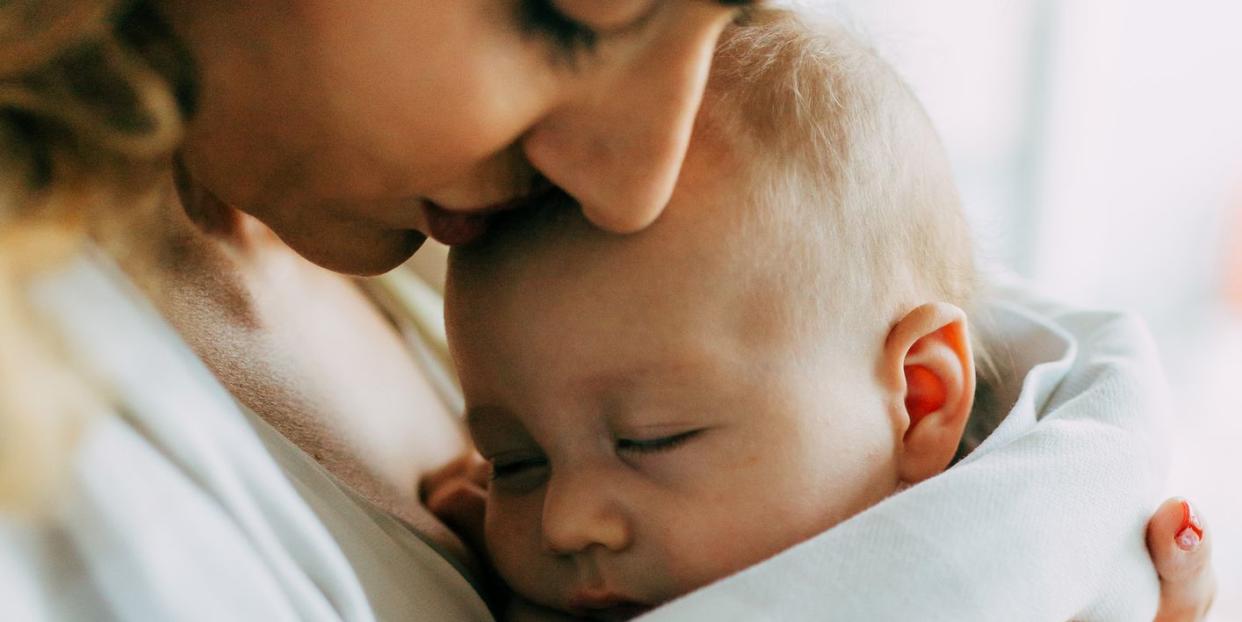What happens if you struggle to bond with your baby?

Some new parents report falling in love with their newborn baby the moment they set eyes on them, while others take a cursory glance and hand the baby straight over to the midwife so they can get some much-needed sleep. Each of us reacts to those first few minutes of parenthood differently and there is no perfect way to bond with your newborn baby.
But for some new mums, including many of the 15 per cent of women estimated to suffer with postnatal depression, feeling unable to bond with your baby – sometimes for many months after the birth – can be a source of deep shame and sadness.
We speak to child psychologists Dr Angharad Rudkin and Emma Citron about why some parents struggle to bond straight away, how this effects the baby and ways to create a special bond:
What is baby bonding?
Bonding refers to the special attachment that forms between a parent and their children. It makes parents instinctively care for and nurture their child and gives babies a sense of security and self-esteem.
Hormones play a vital role in establishing parent-baby bonding. The 'feel-good' hormone dopamine can aid the attachment process, while the ‘love’ hormone oxytocin, released thanks to skin-to-skin contact, can facilitate bonding. Studies have also found that mothers with a high level of the hormone oxytocin in the first trimester engaged in more of the bonding behaviours.

Why do some parents struggle to bond?
Struggling to bond with your new baby is a subject that can trigger tremendous guilt in parents, but it's actually quite common for attachment to be a gradual process.
'Bonding with your baby can take time – far more time than you think – and there are many reasons it might not happen immediately,' says Dr Rudkin.
'The birth may have been long and traumatic. Also the mother may be suffering from depression or anxiety, which can affect her ability to bond.'
Don't panic if you don't feel overwhelmed with love at first. But at the same time, be aware that if the situation continues, you need to seek help and there's no shame in doing so. Mums need to take the pressure off themselves to be perfect. You just need to be doing OK.
Gemma's story
When Gemma Carling, 34, gave birth to her son Sam, now two, she had no feelings for him whatsoever. 'I looked at him and just didn't feel like he was my child. I'd had an easy pregnancy and a straightforward birth but looking back, I'd got pregnant a few years earlier than I'd planned to and I think that deep down, I just didn't feel ready to be a mum,' she says.
'Those first few days at home were horrible. When he cried I felt like throwing him down the stairs. I went through the motions for about two months before breaking down in front of the practice nurse at my GP's when we went for Sam's first immunisations.
'I had counselling, and it was such a relief to be able to tell someone about how I really felt. As Sam grew and I became more confident as a mum, I slowly began to bond with him. But I'll always worry that I didn't give him enough love in the early days.'
Surviving the fourth trimester
Although your baby is now born, the fourth trimester refers to the first three months of their life during which your newborn is entirely reliant on you for care, love and attention.
If you struggle to bond during this early stage you may feel concerned, but, says child psychologist Emma Citron, as long as you're able to physically care for your child such as feeding and changing them and providing somewhere safe and warm for them to sleep, it's OK to just go through the motions initially and focus on survival.
'When they are very young they won't notice a lack of emotional engagement. Try to keep feelings of guilt to a minimum and remember, if you're worried enough to think there's a problem, that's evidence right there that you're a good mum.'
The importance of secure attachment
While the fourth trimester is all about survival, if you still struggle to bond with baby after the first year, then seek professional help.
'If bonding doesn't happen within the first two or three years of a child's life, it can be difficult to make up that time afterwards,' says Dr Rudkin.
'Bonding helps the baby develop what we call a secure attachment – so a sense of being loveable, and faith in the fact their needs will be met. It's the blueprint on which all future relationships are based. Children who are securely attached grow up to have better self-esteem and to be more self-reliant.'
Can you fake it to make it?
While Dr Rudkin agrees with the concept of 'faking it', she says that the instinctive cooing and gazing mothers engage in with their babies is very important too, as your response to your baby's verbal and non-verbal cues will encourage their blossoming communication skills.
'If all you can manage is five minutes a day, that's fine,' she says. 'Do as much as you feel you can. Acting the part may actually help trigger those feelings in you for real.'
When baby bonding starts to happen
Like falling in love with a new partner, these things can take time, and patience is the key to letting it happen naturally.
'Trust that you will start to bond and when you do, try not to overcompensate by cramming in a ton of baby-related activities that you feel you "should" have done by now,' says Citron.
'If you're not a baby class kind of person, don't do them. Just spend time with your baby instead. There will be plenty of time for all that later.'
How to love bomb your baby
If you're keen to speed up the process or you're concerned that the bonding process is taking its time, in his book Not In Your Genes, psychologist Oliver James outlines a technique he calls 'love bombing' for when things haven't gone quite to plan in the early years:
❤️ The love bombing technique can reset the emotional thermostats of children aged from three to puberty.
❤️ It entails a period of time alone with your child, offering him or her unlimited love and control. It can help with many common problems, such as defiance, aggression, shyness, trouble sleeping and underperformance at school.
❤️ You create a special emotional zone that's wholly different from normal life, for a limited period of time (it can be a whole weekend or just a few hours), and allow your child to take charge of the activities you do together while you tell them often and gently how you love them and enjoy being with them.
❤️ Children love feeling in control (and here it is appropriate for them to be so) and experiencing their parent's undivided love and attention.
❤️ Parents have reported that their children actually revert back to baby talk or acting in other ways like a baby, which is what you're aiming for – you're giving them the chance to go back to earlier periods but this time it's really, really good: they feel totally safe, loved and in control.
❤️ It stabilises cortisol levels and many parents have reported that temper tantrums just stop. At the very least, you are having fun with your child.
Asking for help
If you're concerned about your mental health or inability to bond with your baby, support is available and you are not alone, so don't be afraid to ask for help. 'You need to seek help ideally from outside of the family, because your husband or parents may be too emotionally involved or you may feel judged by them,' says Citron. 'Someone outside of the family, such as your GP or health visitor, is better able to provide neutral support.'
Your first port of call should be your GP or health visitor. For additional support try one of the following resources:
NCT: a charity offering support to new mums.
Association for Post Natal Illness : a charity providing support to mothers.
Pre and Postnatal Depression Advice & Support: support service for families.
Mind: support for new mums to manage the everyday, nurture themselves and dispel the many myths of motherhood.
Last updated: 26-11-19
You Might Also Like


